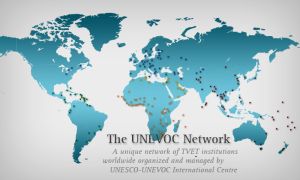-
About Us

The UNESCO-UNEVOC International Centre
-
Our Network

The UNEVOC Network
For Members
- Skills for Work and Life
- Knowledge Resources
The UNESCO-UNEVOC International Centre: Who We Are | What We Do | Working With Us | Get in Touch
The UNEVOC Network: Learn About the Network | UNEVOC Network Directory
For Members: UNEVOC Centre Dashboard
Thematic Areas: Inclusion and Youth | Digital Transformation | Private Sector Engagement | SDGs and Greening TVET
Our Key Programmes & Projects: BILT: Bridging Innovation and Learning in TVET | Building TVET resilience | TVET Leadership Programme | WYSD: World Youth Skills Day
Past Activities: COVID-19 response | i-hubs project | TVET Global Forums | Virtual Conferences | YEM Knowledge Portal
Our Services & Resources: Publications | TVET Forum | TVET Country Profiles | TVETipedia Glossary | Innovative and Promising Practices | Toolkits for TVET Providers | Entrepreneurial Learning Guide
Events: Major TVET Events | UNEVOC Network News

| Author/s: | Maclean, Rupert; Wilson, David (Eds.) |
| Co-Author/s: | UNESCO-UNEVOC |
| Publisher/s: | Springer |
| Published: | 2009 in Dordrecht, Netherlands, Kingdom of the |
| ISBN: | 978-1-4020-5281-1 |
| ULC: | UNEVOC Library Catalogue ID 3936 |
This 6-volume Handbook covers in detail all of the latest practice in technical and vocational education and training (TVET). Edited by two world-leading authorities on the subject, contributions have come from more than 200 international authors, making this a totally comprehensive text on the subject. The Handbook’s aim is to review the developments that have occurred in TVET and provide pointers to improvements in the field.
VOLUME 2
PART III EDUCATION FOR THE WORLD OF WORK: NATIONAL AND REGIONAL PERSPECTIVE
Section 3 Reforming National Systems of Vocational Education and Training (David Atchoarena and Peter Grootings)
1. Overview: Changing National VET Systems Through Reforms (David Atchoarena and Peter Grootings)
2. Latin America’s Efforts in the Vocational Training of Young People from Poor Backgrounds (Claudia Jacinto)
3. Accountability and State Career Technical Education (CTE) Policy: A Brief Review of Six States of the United States (Joshua D. Hawley and Alexandra de Montrichard)
4. The Regional Perspective of Vocational Education and Training (Mike Coles and Tom Leney)
5. Vocational Education, Training Reform and Regional Integration in the Middle East (Munther Wassef Masri)
6. The Influence of Qualifications Frameworks on the Infrastructure of VET (Mike Coles and Patrick Werquin)
7. Reforming Skills Development, Transforming the Nation: South African Vocational Education and Training Reforms, 1994-2005 (Simon McGrath)
8. Reform of Vocational Education in the Russian Federation (Olga Oleynikova and Anna Muravyeva)
9. Vocational Education in the Netherlands: In Search of a New Identity (Jan Geurts and Frans Meijers)
10. Facilitating Policy Learning: Active Learning and the Reform of Education Systems in Transition Countries (Peter Grootings)
Section 4 National Initiatives for Reengineering Education for the New Economy (Joshua D. Hawley)
1. Overview: Regional Reviews of TVET (Joshua D. Hawley)
2. To Vocationalize or not to Vocationalize? Perspectives on Current Trends and Issues on TVET in Africa (Moses O. Oketch)
3. TVET in the Asian Region: Issues, Concerns and Prospects (P.P.G. Lionel Siriwardene and Muhammad Ashraf Qureshi)
4. Transforming TVET Systems with CPSC in the Asia and Pacific Region (Man-Gon Park)
5. European Action Programmes for Lifelong Learning (Johanna Lasonen)
6. VET in the Baltic States: Analysis of Commonalities and Differences of Reforms in Estonia, Latvia and Lithuania (Frank Bünning and Berit Graubner)
7. Education and Training Needs of Rural Communities: A Situational Analysis of Selected Villages in Fourteen Provinces of Fiji (Paula Cavu, Isimeli W. Tagicakiverata, Seveci Naisilisili and Viliame Rabici)
8. Social Partnership in Vocational Education and Training in Lithuania: Challenges and Perspectives (Lina Kaminskiene)
9. Integrating Education and Work: The Status of Vocational Education in Brazil (Lucília Regina Machado and Carlos Roberto Jamil Cury)
10. China’s Higher Technical and Vocational Education: Development and Reform (Jing Mi and Aihua Wu)
11. The Adoption and Adaptation of the Work-Team Concept in Urban Thai Workplaces (Chitrlada Burapharat)
12. Globalization of the Labour Culture in the Republic of Korea: What ‘Tripartite Relations’ Mean for Workers (Phoebe Moore)
13. Involvement of Labour-market Partners in TVET in the Russian Federation (Olga Oleynikova)
14. Strengthening TVET to Achieve Lifelong Learning for All: Historical Snapshots and Recent Initiatives in Myanmar (Naing Yee Mar)
15. Technical and Vocational Education and Traning and Rural Development (Lavinia Gasperini)
16. An International TVET Programme: A Case Study of Programme Development by the International Baccalaureate Organization (Monique Conn)
17. A Profile of TVET in the Asia and Pacific Region: A Survey of Progress, Innovations and Promising Practices to Gauge the Impact UNESCO Recommendations (Chris Chinien, Elspeth McOmish, Mohan Perera and Alex Chinien)
Section 5 Learning for Employment and Citizenship in Post-conflict Countries (David Johnson and Lyle Kane)
1. Overview: Vocational Education, Social Participation and Livelihoods in Post-conflict Countries (David Johnson and Lyle Kane)
2. From Assessment to Planning: Hope for TVET in Uganda (Bilal Barakat, Lyle Kane and Alex Inglis)
3. Linking TVET to Economic Opportunities in Post-conflict Liberia (Lyle Kane)
4. Deepening the Divide: The Differential Impact of Protracted Conflict on TVET Versus Academic Education in Palestine (Bilal Barakat)
5. Co-ordinated Programming for Skills Development and Livelihoods in Post-conflict Societies: What Promise Does TVET Hold for Southern Sudan? (Zuki Karpinska)
6. Vocational Training in Post-war Sierra Leone and Liberia (Andrew Benson Greene Jr.)
7. TVET and Community Re-integration: Exploring the Connections in Sierra Leone’s DDR Process (Julia Paulson)
8. TVET, Women and Conflict: Palestinians in the Lebanese Civil War (Rachel Yarrow)